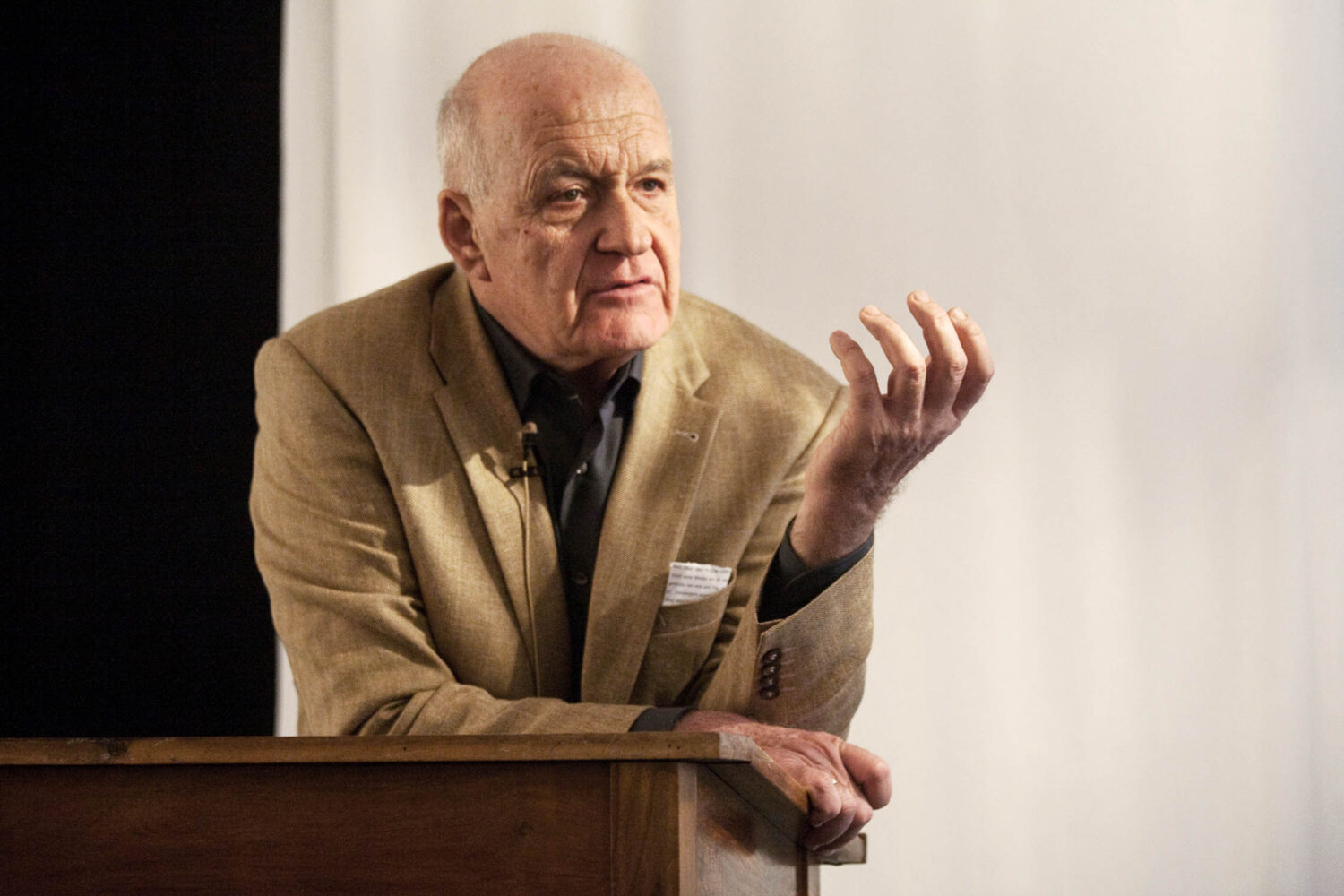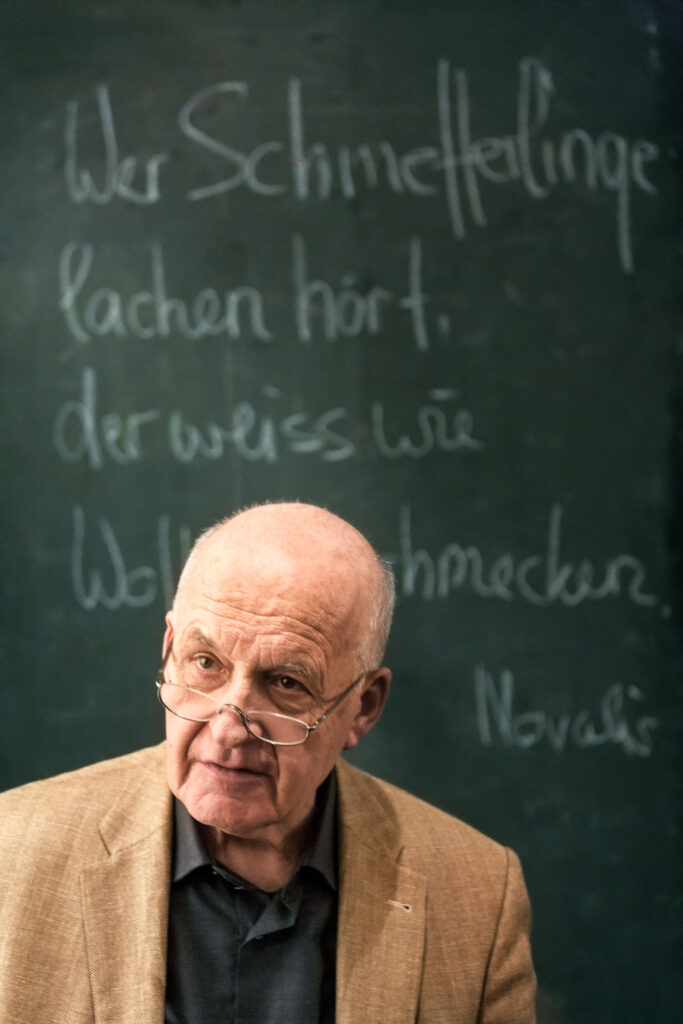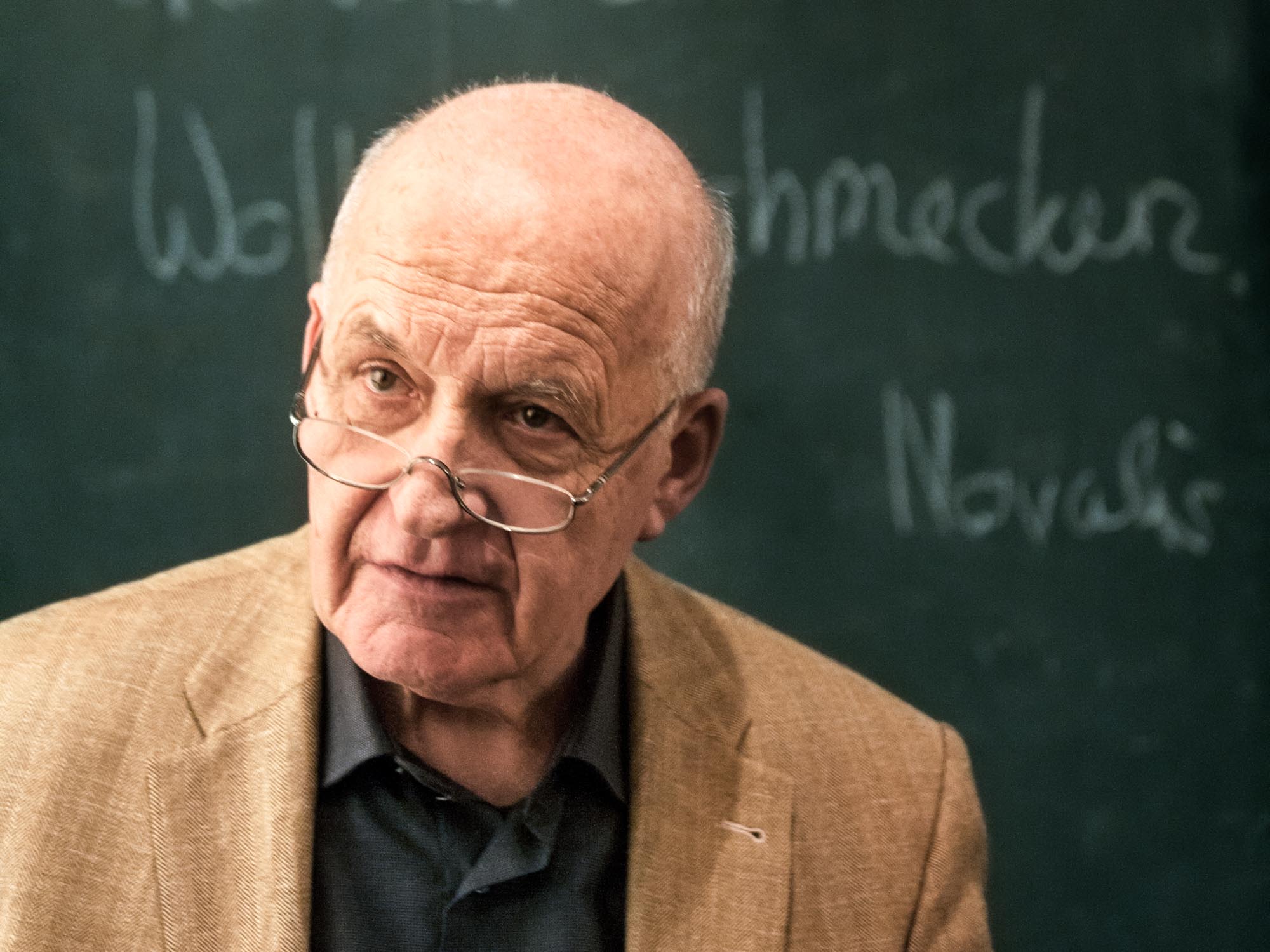A moment like it had happened hundreds of times and I was honored to experience it in parts when we were on the road together for lectures: Götz Werner visited his dm branches in all the cities he traveled to. Not, as one might think, talking to the store manager but he spoke to all the employees he met, personally, warmly, interested, asked how they are doing, how they like the work or how they perceive the people when they are at the checkout. His questions were not aimed at appearances, but always at the heart, at the participation, the commitment of the people.
Once, during such a store visit, he leaned against a shelf with an employee, with a piece of the shelf falling down because it was not properly mounted. The saleswoman mentioned that this had been broken for a while. She had told the store manager, but he hadn’t done anything yet. What did that lead to? Götz Werner said that it was absurd if she, who saw the problem, could not solve it herself, but had to wait until her superior had made a decision on it. It should be the case that everyone can decide for themselves and solve the problems in their field of work independently. After this incident, he changed the organization of his company. Here you can see Götz Werner’s incredible trust in the power of thought, of knowledge – in one’s own, but even more so that of all human beings. You don’t have to give people instructions, you have to support them in understanding connections. Then they themselves are able and motivated to make the right decisions.
Every Person is an Entrepreneur
I believe that this is far too little appreciated, that at dm he established and continuously developed this culture of self-determined work and dialogical cooperation as a model and role model for all other companies. Götz Werner has not only created enormous corporate value with Europe’s market leader in the drugstore trade, but he has also enabled 66,000 people to work meaningfully. His image was and is that in every human being you can find the dormant capacity for self-responsibility. When Joseph Beuys proclaimed to us: «Every person is an artist!», Götz Werner responds: «Every person is an entrepreneur!»
He had this confidence in every human being and believed that thinking makes reality accessible, that he or she can penetrate and understand reality if he or she thinks and with that can change it accordingly. While all too often we only look at abstract ideas and forget people and thus the ideas become systems or ideologies or, conversely, we only look at our fellow human beings and lose the clear thought, with Götz Werner both were two inseparable sides of the same coin – thinking and humanity.
He wanted to build his company in such a way that everyone who works there is able to make decisions independently. Therefore, everyone should overlook the whole operation from his or her position. Far too little known is therefore a first groundbreaking innovation with which he created the conditions for this in the first place: to make the valuation calculation in the company so transparent that every employee could see from their position where the whole company stands and how he or she contributes to it. If everyone has this dynamic overview, then, according to Götz, you don’t have to tell people what to do, then everyone can see what is best within their own framework, within their competence.
I remember Götz Werner above all else in this special posture: upright, with alert eyes, and with a slightly tilted head. He listened to someone who told him about an idea, a new thought. That’s what the human encounter was all about for him, that gave him this incredible joy that he had in the thought of another person, which made him a learner, a student until the last years of his life. However, as soon as the thoughts of his fellow human beings were imaginary or abstracted, Götz Werner lost interest. It always had to come from the human being, connected with the human being. For Götz Werner, the thought itself was already an action. Being active and thinking – how often do we see both as opposites! In the philosophical entrepreneur, the entrepreneurial philosopher Götz Werner, both celebrated a unity. That’s what makes a great personality that it likes to combine seemingly contradictory things in itself.

Götz Werner and I were often invited to events together, where we found each other seated next to each other on the podium. We mostly talked about the unconditional basic income – but often I also talked about direct democracy. Once he approached me after such an event. He said that the idea of direct democracy had never meant much to him before, but now he had recognized that an unconditional basic income and direct democracy belonged together because it was about the same idea of self-improvement, both economically and politically. «Let’s work together!», he exclaimed – and that’s how we started a long, fruitful collaboration, especially with the Omnibus for Direct Democracy and Johannes Stüttgen. Here is another characteristic of Götz Werner: he was highly flexible in his thinking and at the same time had this enormous power of thought and decision-making.
Götz Werner was skeptical about the Goetheanum at the time, and his image was shaped by past experiences. He suspected that anthroposophy had lost touch with the time and the world, and he advised me against accepting the call to head the Social Science Section. He also no longer wanted to talk about ‹threefolding›, it seemed abstract to him. But he did come, with his family, at least briefly to one of my first social science conferences on the way to his Swiss vacation home. There was another surprise: a lecture on the topicality of social threefolding had electrified him so much that he had to tell his wife that he wanted to stay for the whole conference. Again it was the idea that won him over and moved him so much that he changed everything. He was able to confront ideas through experience – and they became his ideal, changed him, his plans, his actions, his life, the world!
Work is part of being human, it shapes our existence – and determines a large part of our lives. One of the motives of his life was to liberate work from dependence, from false drudgery, burden, and coercion. Happiness when work has meaning and you experience that meaning, that idea burned like a fire in his soul. He wished this happiness for all human beings. You can’t work for money, that destroys people. In the unconditional basic income, this fire became a campaign, and the entrepreneur Götz Werner a formative personality in culture and politics.
As with any campaign, it comes down to the idea, the person who makes it their business, and the right time. Nothing is stronger than an idea for which the time has come! There were initiatives for basic income already in the 80s, but anyone who spoke at that time of the dream of unconditional basic financing for all soon heard ‹Go over there!›. At that time, the world was still divided and communism or socialism served as proof that anything that was not born of selfishness and competition was doomed to fail. Capitalism may have its downsides, but it seemed to be the model of success, self-interest, and profit the only possible motivation to work. The willingness to question this ideology only grew again after the fall of the Berlin Wall.
Unconditional Basic Income
Then Götz Werner showed up. Through Rudolf Steiner, especially his course on ‹National Economy›, which he had studied extensively, he had come up with the idea of the necessary separation of work and income and through his lifelong interlocutor Benedictus Hardorp, he had come up with the idea of basic income and had made it his own. With Götz Werner the idea got going! He tirelessly promoted the idea, supported people and initiatives, but avoided the organizations that formed here. Werner wanted to stay free and therefore could do more for the idea of basic income. His entrepreneurial experience and his economic success were the golden reason for his arguments. As simple as they sometimes seemed, they were as profound and effective as they were by virtue of his personality. His willpower gave fire to the idea of basic income. In doing so, he deliberately did not go into the dangerous terrain of numbers and calculations. He always said – knowing how wrong such a calculation could be – that you have to think it first! He wanted to win people over to the big idea, to an idea that can liberate everyone! Many have experienced this liberation, like a force that pulls them upwards internally.
At some events, such as the Swiss vote on the unconditional basic income, activists put gold crowns on all the people who came by. This brings into the picture what happens with this thought: It lifts, it ennobles the person when he understands: You are worth something, you have the ability, you have dignity, and you may be a fully valid person among people, live humanely among people, without having to earn or work for this rank first. It is no longer necessary to earn one’s existence through blood and sweat. No, we take care of each other. As you are, you deserve this existence and this care. And we now want to get to know your best! We want you to show it, practice it, and therefore develop your skills for the benefit of others. This idea lifts us human beings up internally. It also lifted him up. It has transformed what he initially seemed to have won for himself into love. He lived with (and sometimes from) it and he wanted to pass on this fire: that we value every human being as a free personality, that everyone can develop this freedom, that everyone has their own dignity – and that this does not live as a pious saying among us, but as a decision and action with all the consequences. Götz Werner’s economic success proved how reality-soaked and how full of life this idea is. Because here, too, his motivation was never material profit, but the will to enable people to freedom and development so that they could subsequently be better for other people.

To free oneself is a matter of courage. You could also feel that in the encounter with Götz Werner. In conversation, he did not mince his words. He said what he meant, and you had to endure that. At the same time, this openness was free of authoritarian presumption, but rather the authority lay in the truth towards which they were heading together. Thus, eye level was imperative in every conversation. He was curious, eager to experience, and, wherever possible, to learn from others. Every conversation could be an opportunity for this – and it is probably this open-heartedness, this flow of warmth, which is then also found in the finest dilution in the branches of dm. It is interesting that he not only opened the first dm market on August 28, Goethe’s birthday but also that the saying ‹Here I am human, here I buy›, borrowed from ‹Faust›, has persisted to this day. This is only possible if it is reflected in the experience of the people shopping at dm markets.
Gottlieb Duttweiler was an economic role model for Götz Werner. He was a Swiss entrepreneur, politician, writer, and founder of today’s market leader Migros as a cooperative with the establishment of the ‹Culture Percentage›, an obligation to promote intellectual life and culture. The discovery of his life, however, was for Götz Werner Rudolf Steiner. He found in him a source of inspiration as well as inner training. His path also led him to Angelika Sandtmann, Karl Martin Dietz, Thomas Kracht, and Rudy Vandercruise from the Hardenberg Institute in Heidelberg. In 1991, he brought them into his company – along with a number of other anthroposophists – to work with all employees – partly after a one-year internship in all fields of the company – on the development of the power of living thought and action. These training courses were aimed at everyone, from the head of department to the warehouse worker.
Broad Wings and Deep Roots
Every human being can think and should practice and learn it continuously because only thinking can I open up myself and the world. To practice this and work with all employees was a basic motivation of his work. From my point of view, a second was the ‹encounter›, because here, in the in-between, lies the fuel for thinking as well as for doing. From this he developed – strongly supported by K.M. Dietz – the principle of dialogical corporate management. Finally, the third motivation for Götz Werner was ‹responsibility›. Within their position, everyone should bear responsibility, be able to bear responsibility, and be allowed to bear responsibility. Everyone should decide. Here, too, he was concerned with the independence of every human being. He wanted to put an end to old forms of subordination and was against everything where people were performers of the will of another. It was probably above all else the self-experience of living thought experienced through anthroposophy that inspired him and made these ideals shine. Even on vacation, he carried books by Steiner in his suitcase and read them – especially the ‹Philosophie der Freiheit› (Philosophy of Freedom), where Rudolf Steiner develops this power and quality of thought. It is the thought that makes reality accessible to us in the first place. Abstractions – and often numbers – sometimes conceal more than they reveal. That’s another reason why he put it off when asked for a calculation for the basic income. He wanted to convey the big idea. Human beings would find the ways themselves. Of course, everyone knew that he had calculated scenarios. «If you don’t want something, you will find reasons – if you want something, you will find a way», he countered some skeptical interjections. Here, he remained a realistic idealist. Subtly, Novalis then came along: «If not more numbers and figures are keys of all creatures.»
Willpower and the certainty of what thoughts can do has allowed Götz Werner to grow broad wings and deep roots. It was and is always about the human being, the people. He wanted them to become free and liberated to develop themselves. This is the anthroposophical topos of man as a developing human being. If will and thought serve the human being, then what is behind the will energy and what shines through the power of thought, is love.
Of course, a person with such energy also offends. It already started at school and at home. He wasn’t good at school and left school after eleven years. He had a hard time in his father’s business. Götz wanted to change too much. His father threw him out, he thought nothing of his son’s ‹crazy› ideas. He didn’t stay long at the next company either. Until he founded his own. What started with a single store is now a company in 14 countries with more than 2,000 stores. Götz Werner didn’t want it for himself, but for the people. Therefore, he contributed his shares to a foundation and ‹gave away› the company. With the company, it is ultimately just like with the thinking, with the experience, with the learned – and just like with the idea of the basic income, which wants to make every person an entrepreneur: In the end, you can not own anything, but only share. Everything gets stronger the more you give it away. Götz Werner started early.
Pictures: Götz Werner, Photographer: Stefan Pangritz














A good article! Maybe a follow on with the title: Everyone is an Entrepreneur . .?